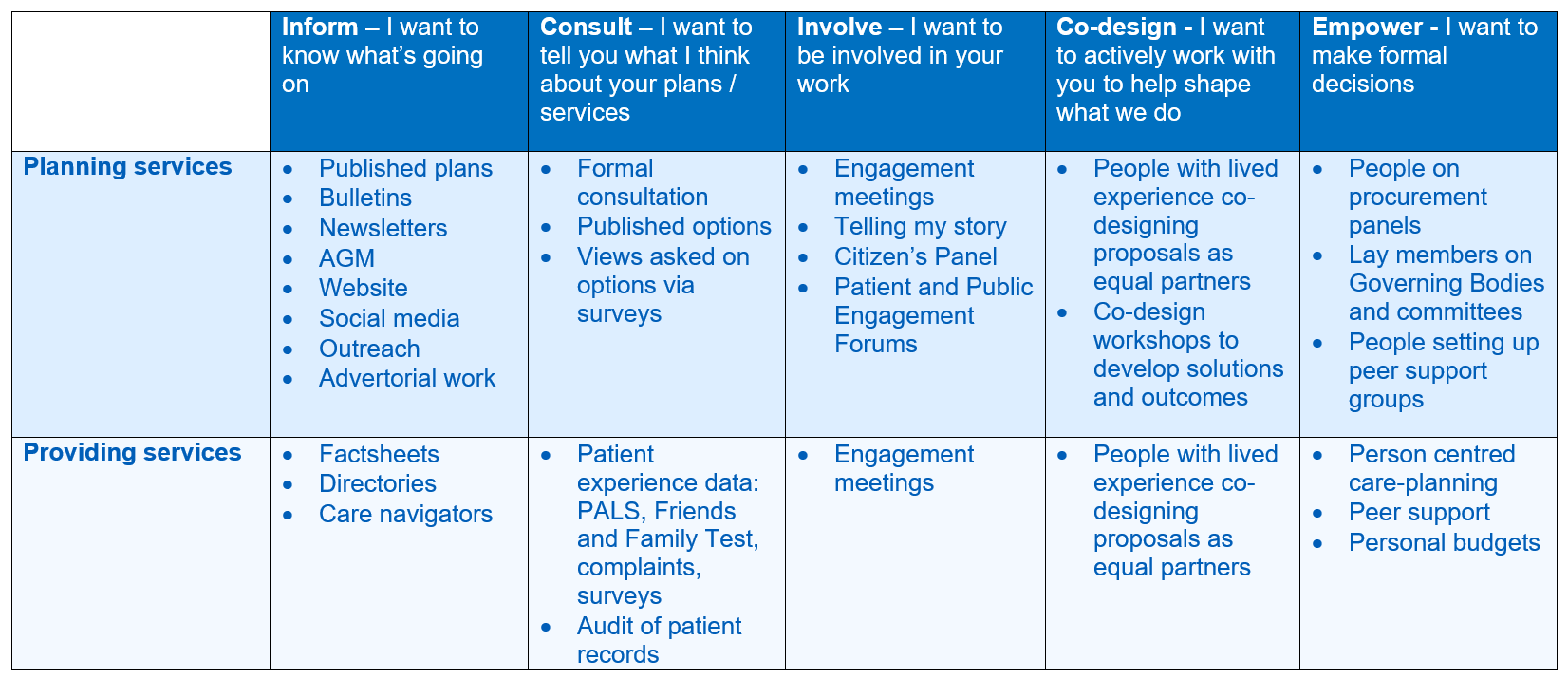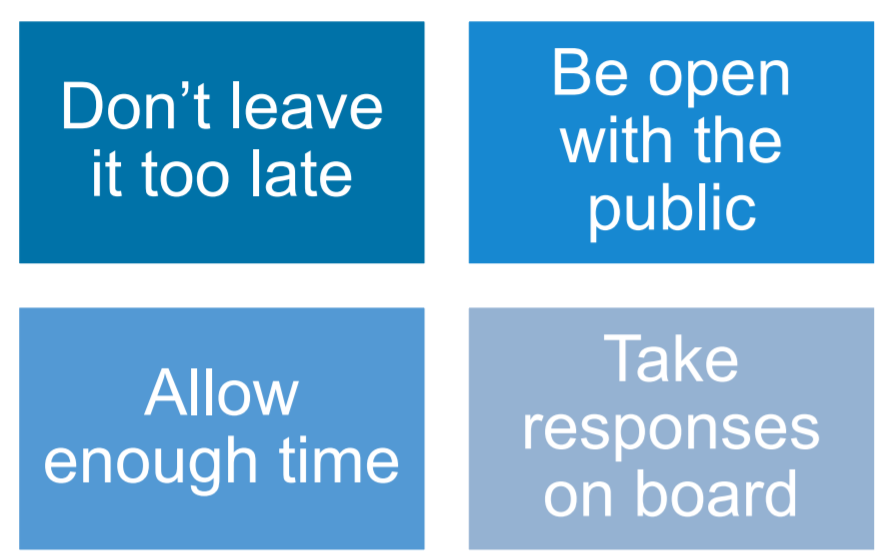Public and patient engagement toolkit
This toolkit is designed to help ICB colleagues to engage and involve local people in their work in a meaningful way. This is a resource that explains why public engagement is important, and aims to help you understand when and how to involve and engage our patients, carers, and the public. It sets out ten steps for planning, delivering and evaluating engagement activity and has been produced in line with NHS England and Improvement’s (NHSEI) statutory guidance for involving people in their own health and care. Many parts of this toolkit will also be relevant to other health and care organisations that form part of the Bath and North East Somerset, Swindon and Wiltshire Partnership, and we plan to update it over the coming months to also reflect the engagement approaches of our partners.
The ICB is always happy to guide and advise you in your engagement work. We hope that this toolkit will help you feel more confident in your engagement work with patients and the public, providing you with the skills and resources you need. This will ensure we exceed our statutory duties to involve patients and the public effectively and systematically in our work. For further advice you can contact us at:
-
What public and patient engagement and involvement is and why it is important
Engaging and involving patients, the public and carers is vital if we are to achieve our vision of “working together to empower people to lead their best life”. We want to understand what really matters to local people in their health and health services and involve them as active partners in decisions that may affect them.
The Health and Social Care Act 2012 requires the CCG to work with its local Healthwatch organisations. We already work in partnership with Healthwatch B&NES, Healthwatch Swindon and Healthwatch Wiltshire and we are committed to strengthening this partnership. The people of B&NES, Swindon and Wiltshire are at the heart of our Communications and Engagement strategy, and hearing what matters to the residents of our communities will help us to ensure better, improved health and care services in our local areas.
We believe engagement should not be one off but a continuous process that builds relationships with the public, our patients and our communities and stakeholders.
At the heart of community engagement is the principle of working with, not doing to. We work with people as partners, who have knowledge and skills to share and shape what we do; not as people to have things done for them.
The term “co-production” is often used, and by this we mean we want to work as equals and make the best use of our resources and strengths, to find ways of doing things that benefit our community. This means involving people from the start in service redesign and valuing them as equal assets.
There is no roadmap for co-production; the process will look different each time, as the nature of the ‘problem’ and the group of people involved in solving it, will vary. We aim to genuinely have co-production and not use the term as a token tick in the box. We want to involve people in decisions that affect their lives and giving communities collective ownership.
We are co-producing the BSW Partnership engagement model to ensure it reflects our approach to engagement and to ensure we have consistency in the work we do.
Information about how we work with the voluntary and community sector, Healthwatch, our approach to engagement and how we reach out to seldom-heard groups can be read in the CCG’s Communications and Engagement Strategy.
Through engagement, communities can have the potential to promote health from the bottom up. Listening to, hearing and acting on the views of the community – particularly those from socially, economically and the seldom heard - ‘the voiceless’ – can both empower communities and lead to the co-production and implementation of interventions that are more likely to be feasible, acceptable and ultimately effective in improving health. People with the greatest health needs are often socially excluded and disengaged from services, and their circumstances can make it difficult for organisations to address their needs appropriately. Opportunities to work with their peers through community engagement initiatives may improve their social inclusion of marginalised people.
During the Covid-19 pandemic, health inequalities have become more apparent. It is important that we continue to develop and build upon the partnerships developed in our future engagement work.
Key documents where the importance of engagement and involvement are included and show its importance are:
- The NHS Constitution enshrines public ownership of the NHS as a fundamental value.
- The Five Year Forward View sets out a vision for growing public involvement.
- The Marmot Review, Fair Society, Healthy Lives (2010) shows the difference in life expectancy for different socioeconomic groups. So, if we listen to and involve those who experience the poorest health outcomes, CCGs and health and care partners will be better able to improve access to services, reduce health inequalities in our communities and make better use of resources.
- Joint Strategic Needs Assessments (JSNAs) analyse the health needs of populations to inform and guide commissioning of health, well-being and social care services within local authority areas. The JSNA will underpin the health and well-being strategies.
-
When we have a legal duty to engagement
The Health and Social Care Act 2012 sets out the involvement duties for CCGs:
The CCG must make arrangements to secure those individuals to whom services are being or may be provided are involved (whether by being consulted or provided with information or in other ways) in:
- The planning of the commissioning arrangements
- The development and consideration of proposals for changes in the way those services are commissioned (where implementation of proposals has an impact on:
- the manner in which the services are delivered
- or the range of health services available to them and
- Decisions affecting the operation of those commissioning arrangements
How we involve, and to what extent, will depend upon what is fair and proportionate in the circumstances.
The Act also requires the CCG to work with its local Healthwatch organisations. Please see the public and patient engagement section for more details on how we do this.
The Equality Act 2010
The Equality Act 2010 introduced the Public Sector Equality Duty. As a public sector organisation, our general duties include eliminating unlawful discrimination, harassment, and victimisation; advancing equality of opportunity between different groups of people; and removing or minimising disadvantages suffered by people due to their protected characteristics. These are:
- age
- disability
- gender reassignment
- marriage and civil partnership
- pregnancy and maternity
- race
- religion or belief
- sex and sexual orientation.
The CCG has produced an interim Equality and Diversity Strategy which describes our commitment to eliminating all forms of discrimination, increasing our awareness, and providing equality of opportunity for everyone in BSW.
-
Engagement as an empowering process
Engaging with our local population can range from informing to empowering them. Our ultimate goal is towards empowering our population at the same time as recognising that different methods of engagement are appropriate for different circumstances.
The diagram below provides a summary of a range of community engagement techniques, from informing to empowering, and how these can be used.

-
Principles of engagement and involvement
NHS England has developed 10 principles for participation:
- Reach out to people
- Promote equality and diversity
- Seek participation from people who experience health inequalities and poor health outcomes
- Value people’s lived experience
- Provide clear and easy to understand information
- Plan participation, budget for it and involve people early
- Be open, honest, and transparent
- Invest in partnerships and on-going dialogues
- Review experience of engagement
- Recognise people’s contributions and feedback
In addition, National Voices, the organisation that leads on the coalition of health and social care charities in England to strengthen the voice of patients, service users, carers, their families and voluntary organisations has developed six principles for engaging people and communities.
-
The Gunning Principles
These were confirmed by the Court of Appeal in 2001 and apply to all public consultations that take place in the UK.
In summary:

Learning from case law where the Gunning Principles were applied:
- Give sufficient notice of consultations
- Information needs to be accurate, comprehensive, and sufficiently detailed
- Appendices
